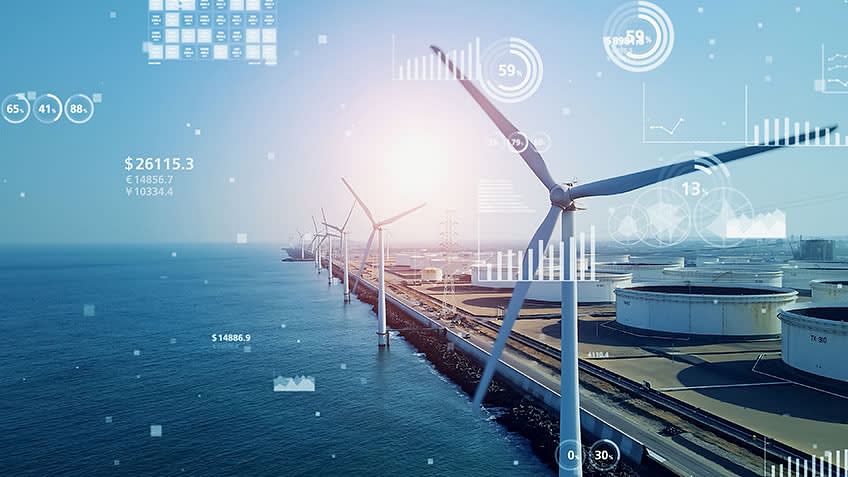Look anywhere in the news today or on social media and you’re likely to see some mention of cryptocurrency or NFT products. For example, investment in NFT (non-fungible tokens) art is booming — Sotheby’s, Christies, and Phillips sold over $185 million in NFTs last year. NFT sneakers from Nike to be used in the Metaverse are going for about $8,000. Popular payment platform, Stripe, is testing a program that would enable users to soon get paid in cryptocurrency.
These are just a few examples of the growing trends that are arising at the junction between blockchain technology and data science. Both data science and blockchain are having a moment in terms of emerging applications, market growth, and industry buzz.
On a practical level, the connection here is data. But the relationship between data science and blockchain is more complex and increasingly interlaced.
A Breakdown of Data Science and Blockchain
Firstly, it’s important to understand that data science is a discipline and blockchain is a technology.
Data Science
Data science involves working with massive quantities of data through a variety of tools with the goal of extracting valuable, analytics-based insights for decision making and to solve business problems. Machine learning algorithms are a major component of data science since they’re used to develop predictive models for forecasting future events.
It’s a team sport that often includes a number of roles, such as an application developer, business analyst, and data engineer, among others. Data scientists help companies realize the value of their data by analyzing, prepping, exploring and visualizing data, and developing models with different programming languages, like R and Python.
Blockchain
In the simplest terms, blockchain is the ultimate secure record keeper. It’s a form of distributed ledger technology (DLT) that enables transactions and data to be recorded, shared, and synced throughout a distributed peer-to-peer (P2P) network. It’s based on three main ideas: smart contracts, distributed ledger design, and cryptography, and is designed to be indelible and secure to ensure the system and any data stored on it are impervious to being hacked or changed. The global blockchain market will be worth over $227 billion by 2028, up from $4.93 billion in 2021. Many data scientists pursue jobs in blockchain because apart from offering numerous interesting career paths, it revolves around programming skills, data structures and architectures, and cybersecurity.
Let’s return to our earlier examples of cryptocurrency and NFTs for a moment, which are supported by blockchain technologies. As blockchain and NFTs become more embedded in everyday consumer engagements and products, as well as being key economic elements in the metaverse ecosystem, data science will be an increasing cornerstone.
In fact, a quarterly data science competition for NFTs has emerged, backed by organizations like NASA JPL, that focuses on challenging participants to gather data sets to build dashboards that evaluate NFTs trends and predict their future course. The competition was developed by RMDS, a science and technology IP NFT marketplace founded by a Harvard Data Science Review advisor, and aims to help accelerate technology and science innovation.
Demand in blockchain and NFT related fields are growing, such as NFT Commercial Development, Cryptocurrency Engineer, Metaverse Infrastructure Developer, NFT Trader, and NFT Project Lead. All of these roles rely on various data science expertise, including software engineering, data analytics, dimensional data modeling, and languages such as Rust, Solidity, Python, and C++.
Unlocking Data Science Innovation With Blockchain
When used in conjunction, data science and blockchain can potentially drive substantial business value. As organizations look to address vulnerabilities emerging from security concerns due to ongoing remote work models and disparate IT architectures, new possibilities for blockchain solutions have emerged.
Data scientists often face numerous common challenges related to data quality, data accessibility, data availability and privacy, and real-time analysis during the course of their day to day tasks that blockchain could help address.
- Accelerate data access and analysis processes by enabling data scientists to be conditionally integrated into the blockchain to securely access data.
- Reduces need to share original data via homomorphic encryption, which enables computation to be executed on encrypted data.
- Facilitates real-time analysis by maintaining records for all data transactions.
- Enables data authenticity to be efficiently substantiated because blockchain inhibits data tampering and alterations.
Learn over a dozen of data science tools and skills with PG Program in Data Science and get access to masterclasses by Purdue faculty. Enroll now and add a shining star to your data science resume!
Data Science and Blockchain Continue to Collide
One of the most exciting aspects of data science and blockchain is that as a discipline and technology, respectively, they’re both in their infancy and have the potential to continuously disrupt and revolutionize industries via remarkable innovations.
Visit Simplilearn for more information about blockchain technology and data science, including education opportunities, certifications, and career paths. Start your career in data science with Simplilearn's Data Science course. You can also enroll in our Blockchain Bootcamp in collaboration with the University of Minnesota. This program helps you learn and explore more about cryptocurrencies, blockchain, and all the associated technology, accommodating all levels of experience.
